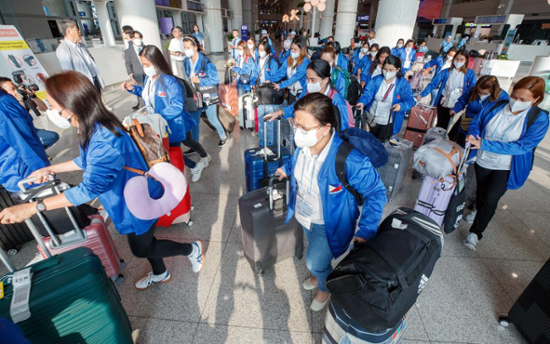- Don’t Use Your Retirement Savings To Pay For Your Kid’s College
- December 17, 2024 (earn up to 5.00% APY)
- Best savings interest rates today, December 25, 2024 (top rate at 4.66% APY)
- The Best Affordable Wide Angle for Sony has Savings
- How it affects your bank accounts, loans, credit cards, and investments
Filipino caregivers participating in the foreign domestic worker pilot program arrive at Incheon International Airport, Aug. 6. Korea Times file
Bạn đang xem: Filipino caregivers in Korea struggle with high costs, low savings
Survey reveals caregivers earn 1.12 million won monthly, grapple with high costs, long commutes, no savings
By KTimes
Filipino caregivers brought to Korea in September as part of the Seoul Metropolitan Government’s foreign domestic worker pilot program, are struggling to save money due to Seoul’s high cost of living, leaving them with barely enough for daily expenses.
A survey on the satisfaction levels and other issues faced by Filipino domestic workers, conducted by the Korea Federation of SMEs in early October and obtained by the Hankook Ilbo on Sunday, vividly details the workers’ various grievances.
One caregiver said, “My income is so low because weekday shifts are short, so I’m forced to work on weekends too. I haven’t had a day off all week.”
Another, living in a dormitory in the affluent Gangnam area, said, “The dormitory rent alone is 539,000 won ($410), which is too expensive. With the high cost of living in the city, nothing is left in my account. I’m deeply worried about my family back home.”
Wages and deductions leave little for savings
The survey revealed that caregivers are often housed in cramped dormitory rooms of approximately 3.3 square meters (35 square feet), with a monthly rent of about 539,000 won.
They complained that the dormitories are “too cramped to move around in,” and the “accommodation costs are too high.” While some said they were “satisfied with the salary itself,” they noted that “dormitory fees, transportation, food and other necessary expenses are all self-funded,” leaving nothing from their wages.
One September pay stub showed a gross salary of 1.83 million won, from which approximately 40 percent (710,000 won) was deducted for lodging, communication fees, income tax and social insurance. This left the worker with around 1.12 million won for food, transportation and other living expenses in Seoul.
The findings stand in stark contrast to claims made by some Korean politicians that foreign workers send up to 80 percent of their earnings back to their home countries.
Rep. Na Kyung-won of the ruling People Power Party, previously said, “Foreign workers send back most of what they earn,” while Seoul Mayor Oh Se-hoon argued that Korean wages far exceed those in their home countries.

Filipino caregivers arrive at Incheon Airport on Aug. 6 to begin training before starting work in 140 Seoul households on Sept. 3. Korea Times file
Harsh working conditions
The caregivers’ testimonies highlighted challenging working conditions, often involving tasks beyond their original job scope. This expanded scope of work, which had sparked controversy even before the pilot program started, has become a significant source of confusion and dissatisfaction.
The Philippine government clarified that the workers were skilled caregivers, not domestic helpers, and made it clear that their household tasks should be limited to child care.
In contrast, the Korean government promoted the workers as capable of handling both child care and general household chores, leading to a mismatch in expectations and growing frustrations on the ground.
The caregivers said they had no time for proper meals, resorting to eating hurriedly in parks or subway stations while commuting between job sites.
Some caregivers endured daily commutes of over four-hour round trips, leaving them both physically and mentally exhausted. Frequent visits to multiple households further compounded the strain, with many reporting that travel consumed much of their time and energy.
There were also reports of employers demanding tasks beyond the job’s official guidelines, further exacerbating their workload.
Xem thêm : Older Americans Regret Not Saving for Retirement and Feel Lonely
One caregiver said, “I was told I’d be a caregiver, but I’m expected to clean five rooms, including the living room and kitchen, do laundry by hand, and work eight hours straight without rest. It’s so exhausting I feel like crying.”
Another worker said, “I came here expecting to care for children with limited mobility, patients, or the elderly, but I was surprised and confused to find myself doing general household chores instead.”
Despite these concerning findings, the government is pushing to expand the pilot program nationwide without completing its six-month evaluation. The Ministry of Employment and Labor has asked local governments to submit responses by Dec. 27 to participate in next year’s program, which aims to recruit 1,200 workers.

Labor and civic group officials hold a press conference in front of Seoul City Hall on Sept. 26, urging the city to ensure the rights of caregivers participating in the foreign domestic worker pilot program. Korea Times photo by Ha Sang-yoon
Calls for reevaluation before program expansion
Labor and civic groups have repeatedly pointed out fundamental flaws in the program’s design and direction, citing its potential to exploit foreign workers and worsen conditions for local workers.
On Dec. 18, International Migrants Day, the Korean Confederation of Trade Unions said, “An indiscriminate migrant labor policy directly harms the employment and working conditions of local workers.”
It said that while the domestic housekeeping service industry has long been an undesirable sector due to low wages and poor working conditions, Seoul has chosen to replace local domestic workers with Filipino caregivers rather than improve local wages and conditions.
The statement also emphasized that the program could lead to both the exploitation of foreign workers and the further deterioration of conditions for local workers. The program has also faced criticism for lacking indicators that it addresses Korea’s low birthrate, its stated goal.
Criticism has also emerged that the policy disproportionately benefits affluent families, as half of the pilot program applicants and one-third of the selected households were from Seoul’s Gangnam District, prompting some to label it “a policy catering exclusively to Gangnam parents.”
This article from the Hankook Ilbo, the sister publication of The Korea Times, is translated by a generative AI system and edited by The Korea Times.
Nguồn: https://poissondistribution.lat
Danh mục: News





